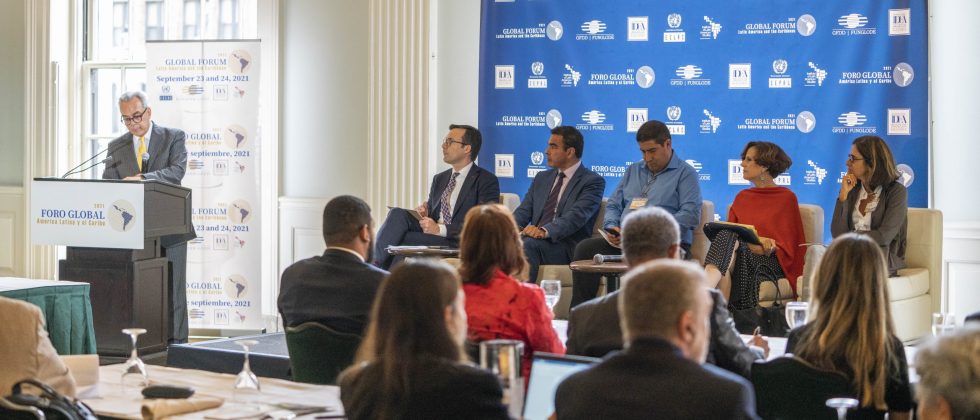news
Political Scientists and Economists Warn at the Global Forum on Latin America and the Caribbean 2021 of Democratic Setbacks in the Region
September 24, 2021
During the first three panels that took place during the first day of the Global Forum on Latin American and the Caribbean 2021, prominent analysts warned of the emergence of populist and autocratic governments. They shared their thoughts at the Forum, organized by Funglode/GFDD, along with IDEA International.
NEW YORK. – Experts from different countries warned about the threat that they believe looms over democracy in the Latin American and Caribbean regions, where there is a strong tendency for the emergence of populist and autocratic governments.
Daniel Zovatto, Regional Director for the Americas and the Caribbean of the International Institute for Democracy and Electoral Assistance (IDEA International), said that the region is experiencing a moment of profound political changes, where several of its nations are suffering setbacks and democratic deterioration, as well as the possibility of the emergence of new authoritarian regimes.
The expert said that this situation occurs at a time when the Latin American and Caribbean regions are experiencing a new electoral super cycle that began with the general elections held in Bolivia in October 2020 and that will culminate in 2024, with the celebration of elections in several regional countries.
Zovatto indicated that during this period all Latin American countries, except Cuba, will go to the polls to elect or re-elect, by direct or popular vote, their respective presidents and legislators.
He also explained that during 2021 there will be five presidential and legislative elections. In Ecuador and Peru (already held), and in Chile, Nicaragua and Honduras (in November), while in El Salvador and Mexico legislative elections already took place. Argentina will hold elections in November. Chile held elections to elect 155 constituents last May.
He said that, similarly, there will be local or regional elections in El Salvador, Bolivia, Chile, Mexico, Paraguay and Venezuela.
“This super cycle is expected to be complex, with a high level of uncertainty and bringing multiple challenges to our region,” Zovatto warned during his speech at the Global Forum on Latin America and the Caribbean, currently taking place in New York City with the participation of several former presidents and international experts.
He affirmed that the greatest risk is that this new electoral super cycle, as a result of the current complex economic-social scenario, could bring about citizen unrest and lack of confidence in the traditional elites and parties. This could open the way to greater polarization and instability, increasingly complex governance systems that could facilitate the coming to power of new populist leaders.
The Panelists
Panelists included Manuel Orozco, Director of the Center for Migration and Economic Stabilization; María Victoria Murillo, Director of the Institute for Latin American Studies (ILAS), and Denise Dresser, professor at the Technological Institute of Mexico (ITAM).
Other participants included Patricio Navia, professor at the Center for Latin American and Caribbean Studies in New York City, and María Herminia Brandao Tavares, researcher at the Brazilian Center for Research and Planning (CEBRAP). Gustau Alegret, Director of the Press Club and served as moderator, Director of the Press Club and the political television program “Cuestion de Poder”.
In his remarks, Manuel Orozco highlighted the role that remittances have played in the development of Latin American and Caribbean countries since the outbreak of the pandemic crisis.
A migration specialist, he highlighted the passive attitude that he believes the international community maintains regarding the threats that loom over Latin American and Caribbean democracies.
At the same time, María Victoria Murillo predicted that the current political scenario in the region will generate significant fragmentation and a serious problem of governance.
Denise Dresser reviewed the political landscape of Mexico, indicating that the Mexican State is currently being dismantled.
Moreover, Patricio Navia affirmed that the Latin American and Caribbean regions need public policies that guarantee sustained growth and an expansion of the middle class.
The panel concluded with the intervention of researcher María Herminia Tavares, who also drew attention to the weaknesses that plague democracy in the region and highlighted that overall inequality has deepened during the Covid-19 pandemic.
















